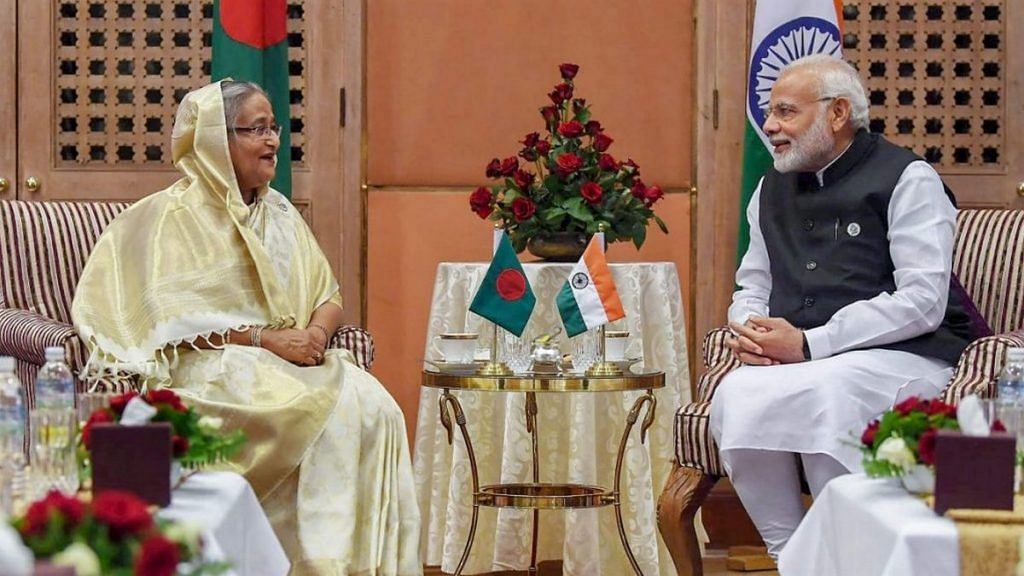One week before Prime Minister Narendra Modi and Bangladesh PM Sheikh Hasina join a virtual summit on 17 December to commemorate the beginning of the 50th anniversary of the independence of Bangladesh, engineers and workers of the China Railway Major Bridge Engineering Group Co, along with their Bangladeshi counterparts, laid the final span of the 6.15-km-long Padma bridge.
It was a huge day for Bangladesh. The media witnessed the historic occasion. Mahfuz Anam, editor of Bangladesh’s biggest English-language newspaper The Daily Star and a ‘muktijoddha’, a freedom-fighter himself, who has often been critical of Hasina’s government, put it succinctly:
“It was Bangabandhu’s “political will” that contributed so much to Bangladesh’s birth. Similarly, it is Sheikh Hasina’s political will that lies at the core of the Padma Bridge becoming a reality. It was her single-minded determination to build it and the courage to overcome many of the vicissitudes that befell it…” Anam said.
Also read: Don’t go by IMF prediction, Bangladesh hasn’t beaten India as South Asia’s economic champion
The bridge on the river Padma
In many ways, it is the story of this two-level steel truss Padma bridge — which will carry a four-lane highway on the upper level and a single railway track on the lower level — that defines how China has pushed its way into South Asia and replaced India’s overweening influence in the region. And nowhere is this more evident – or ironical – than in Bangladesh, where India is finally stepping up its game, after years of lassitude, because it was so over-confident of its deep ties with a neighbour it helped achieve independence.
As long back as 2011, then Prime Minister Manmohan Singh had announced a $1 billion line of credit to help build the bridge over the Padma river, which begins where the Hooghly ends and whose fertile alluvium sustains millions of people; this would be added to Bangladesh’s own $3 billion, which it would borrow from international aid agencies.
But the World Bank, the Asian Development Bank (ADB), Japan’s loan arm JICA had other ideas. By 2013, they pulled out on charges of corruption. Mad as hell at their “arrogance” and “high-handedness”, Hasina withdrew her own application. The “deep wound to our self-respect” would push Hasina to say, according to Anam, that “We will have to shrug off our begging mentality.” It wasn’t quite “atmanirbhar.” Hasina was really looking for friends with deep pockets.
By June 2015, when Narendra Modi went to Dhaka, the India story hadn’t moved. So, Delhi disbursed a $200 million grant and offered another $2 billion credit to jumpstart the project. It wasn’t enough. China Railway Bridge, which had won the tender meanwhile, began work in December 2015. In October 2016, Xi Jinping landed in Dhaka, the first trip by a Chinese president in 30 years, and signed off on $24 billion worth of credit. In September 2017, the first of 42 spans was laid between pillars 37 and 38.
Also read: Here’s what China is doing in Bangladesh, Nepal, Afghanistan. It doesn’t look good for India
Time to build new bridges
It’s not, though, as if one bridge can make or break a relationship. The Modi government is now stepping up the charge, offering to revamp a dysfunctional railway line (as old as 1965, when Bangladesh was still part of Pakistan) from Chilahati-Haldibari, among other connectivity projects. Construction has finally begun on a petroleum pipeline, promised in 2018, from Siliguri to Dinajpur. As much as $10 billion credit is likely when Modi visits Dhaka to be part of Bangladesh’s 50th independence day celebrations.
But what is significant is the change of mood in Dhaka. PM Sheikh Hasina has shown herself to be the ultimate realist in South Asia, openly flirting with the Chinese, even though China sided with Pakistan in the 1971 war; in fact, China even vetoed Bangladesh’s application for UN membership in 1972.
So, on the one hand, Hasina will participate in a virtual summit with Modi on 17 December, and on the other is ready to expand Bangladesh’s participation in Xi Jinping’s Belt & Road Project.
Observers say she wants to send a message to Delhi that she won’t forget Union Home Minister Amit Shah’s description of Bangladeshis as “deemak (termites)” who should be thrown into the Bay of Bengal. Moreover, there is the National Register of Citizens (NRC) and the Citizenship Amendment Act (CAA), which promises to disbar Muslim “Bangladeshis” from becoming Indian citizens – a constant source of concern in Dhaka, even though Indian officials have repeatedly said that both NRC and CAA are domestic considerations.
Moreover, unlike India, China’s economy doesn’t seem to have been as badly hit by the coronavirus pandemic. The International Monetary Fund (IMF) data recently showed that Bangladesh had actually outstripped India in its per capita GDP income, although India had a 25 per cent lead only five years ago. This led Bangladeshi economist Ashikur Rehman to say that the “alleged termite factory is shining.”
Still, all is not lost. Bangladesh has recently told China to get lost or pay up for the trials of the Chinese Covid vaccine in Bangladesh, while signing an agreement with India’s Serum Institute to buy three crore doses.
The moral of the story is that the Modi government cannot allow the Bharatiya Janata Party (BJP)’s ideological agenda to ride roughshod over the national imperative. India’s foreign policy, especially in a hugely important and deeply sensitive neighbourhood, is far too important to be left to party considerations. Modi must insist that Bangladesh is a credible exception to any rule.
Views are personal.
